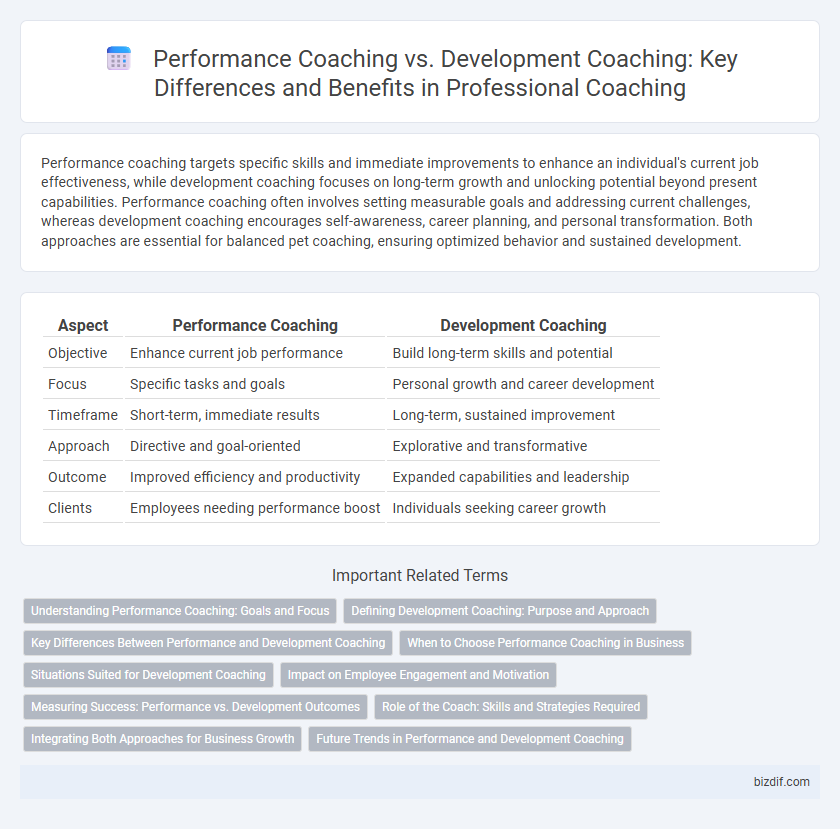Performance coaching targets specific skills and immediate improvements to enhance an individual's current job effectiveness, while development coaching focuses on long-term growth and unlocking potential beyond present capabilities. Performance coaching often involves setting measurable goals and addressing current challenges, whereas development coaching encourages self-awareness, career planning, and personal transformation. Both approaches are essential for balanced pet coaching, ensuring optimized behavior and sustained development.
Table of Comparison
| Aspect | Performance Coaching | Development Coaching |
|---|---|---|
| Objective | Enhance current job performance | Build long-term skills and potential |
| Focus | Specific tasks and goals | Personal growth and career development |
| Timeframe | Short-term, immediate results | Long-term, sustained improvement |
| Approach | Directive and goal-oriented | Explorative and transformative |
| Outcome | Improved efficiency and productivity | Expanded capabilities and leadership |
| Clients | Employees needing performance boost | Individuals seeking career growth |
Understanding Performance Coaching: Goals and Focus
Performance coaching targets immediate skill enhancement and achievement of specific work-related outcomes, emphasizing measurable improvements and accountability. It focuses on optimizing current capabilities to meet organizational objectives and resolve performance gaps efficiently. Development coaching, by contrast, centers on long-term growth, expanding potential and fostering personal and professional evolution beyond immediate tasks.
Defining Development Coaching: Purpose and Approach
Development coaching focuses on enhancing an individual's long-term growth by improving skills, knowledge, and personal competencies aligned with career trajectories and life goals. Its purpose is to foster self-awareness, resilience, and adaptability through reflective dialogue and goal-setting that prioritizes continuous learning. This approach emphasizes a collaborative partnership that encourages exploration, addressing mindset shifts and behavioral changes to unlock potential beyond immediate performance outcomes.
Key Differences Between Performance and Development Coaching
Performance coaching targets immediate skill enhancement and goal achievement by addressing specific challenges and improving job-related competencies. Development coaching emphasizes long-term personal growth, focusing on expanding self-awareness, leadership capabilities, and career progression. Key differences include the timeframe of impact, with performance coaching being short-term and results-driven, while development coaching fosters sustainable transformation and deeper behavioral change.
When to Choose Performance Coaching in Business
Performance coaching in business is ideal when specific, measurable results need improvement within a defined timeframe, such as enhancing sales targets or optimizing team productivity. This approach targets immediate skill gaps and behaviors that directly impact current job performance, making it essential during periods of organizational change or high-pressure deadlines. Choosing performance coaching ensures rapid alignment with business goals by focusing on actionable strategies and accountability.
Situations Suited for Development Coaching
Development coaching suits situations where long-term personal growth and skill acquisition are prioritized over immediate performance outcomes. It is effective in scenarios involving career transitions, leadership development, or cultivating emotional intelligence. This approach fosters self-awareness and adaptability essential for sustained professional advancement.
Impact on Employee Engagement and Motivation
Performance coaching targets specific job-related skills and goals, directly enhancing employee engagement by providing clear expectations and measurable outcomes. Development coaching emphasizes long-term personal and professional growth, fostering intrinsic motivation through self-awareness and career progression. Both coaching types contribute to sustained motivation, with performance coaching driving immediate improvements and development coaching nurturing ongoing employee commitment.
Measuring Success: Performance vs. Development Outcomes
Measuring success in performance coaching centers on quantifiable outcomes such as productivity, goal attainment, and skill proficiency, reflecting immediate job performance improvements. Development coaching emphasizes long-term growth metrics like leadership capacity, emotional intelligence, and career progression, which are assessed through qualitative feedback and self-reflection. Organizations integrating both approaches benefit from combining objective performance data with subjective developmental insights for comprehensive coaching effectiveness.
Role of the Coach: Skills and Strategies Required
Performance coaching demands a coach's expertise in setting measurable goals, providing real-time feedback, and employing motivational strategies to enhance immediate skills and productivity. Development coaching requires a deeper understanding of psychological principles, long-term behavioral change techniques, and active listening skills to foster personal growth and leadership capacity. Mastery in both approaches involves adaptability, emotional intelligence, and the ability to tailor strategies to individual client needs for optimal outcomes.
Integrating Both Approaches for Business Growth
Performance coaching targets immediate goal achievement and skill enhancement to boost productivity, while development coaching emphasizes long-term personal growth and leadership capacity building. Integrating both approaches creates a dynamic coaching framework that aligns short-term performance metrics with broader career development, driving sustained business growth. Organizations leveraging this dual approach experience enhanced employee engagement, improved problem-solving abilities, and increased adaptability in a competitive market.
Future Trends in Performance and Development Coaching
Performance coaching emphasizes achieving specific goals and enhancing immediate skills, while development coaching focuses on long-term growth and personal transformation. Future trends in performance and development coaching highlight the integration of AI-driven analytics to personalize coaching strategies and virtual reality environments to simulate real-world challenges. Embracing these technologies will increase coaching effectiveness by providing data-driven insights and immersive learning experiences.
Performance coaching vs development coaching Infographic

 bizdif.com
bizdif.com